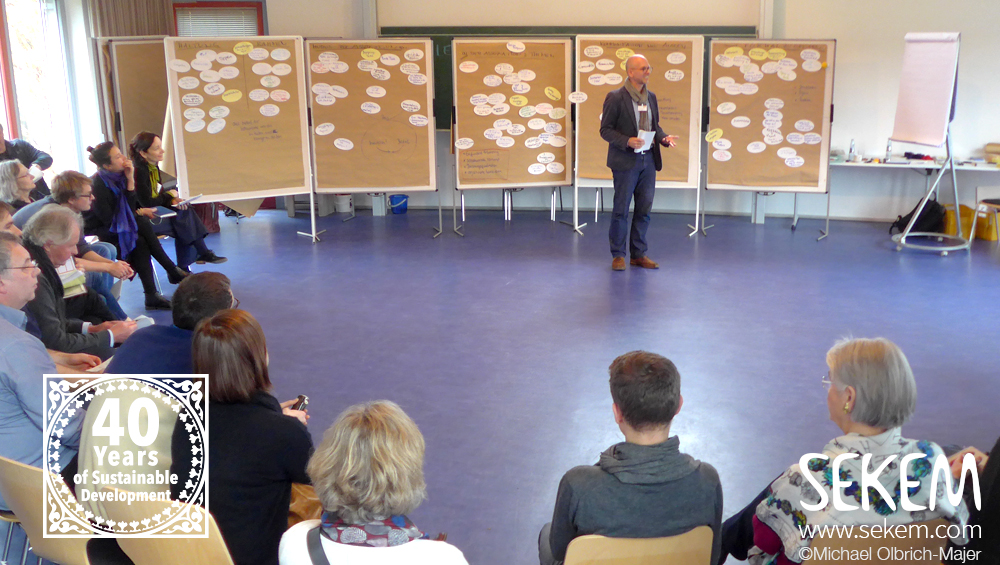At the end of November, SEKEMs CEO Helmy Abouleish attended a conference on associative economics. He introduced SEKEMs commitment to a solidary economy and participated in the drafting of a charter for the Organic market. The following report gives insights into the content that has been developed and explains what associative economics actually mean.
Nowadays economic activities are more than ever aligned to competition and individual profit. Hence, the model of an associative economic system is particularly important and promising. In order to promote an economic-social society, a transparent, responsible and purposeful cooperation between all members of the value creation must be developed. This is one meaningful concern of the Economy Council of the Section for Agriculture at the Goetheanum in Switzerland. The Demeter Association, for instance, implements this approach through associations of farmers, processors, traders and consumers. However, the current market development, that enables customers to buy Demeter-products in large supermarkets and via online platforms, involves a new challenge on the path to an associative economy. “Now it is time to formally intervene and establish new forms,” said Ueli Hurter, Head of the Agriculture Section at the Goetheanum, at the beginning of the conference on “Associative Economics for the Organic Market”, which was organized by the School of Spiritual Science and the Demeter Association. Therefore, the aim of the three-days event, consisting of the Principles Forum and the Economy Council, was held to formulate a “Charter for Associative Economics for the Organic Market”.
What exactly does associative economics mean?
Associative economics mean the consolidation of consumers, traders and producers with the aim of offering everyone involved a fair share of the value creation. First approaches can be found in Fairtrade.
Associations are decentralized organs of governance in the economic life of a social organism in the sense of the threefold idea of Rudolf Steiner. They determine consumer needs and suggest corresponding goods production. From their background, the producers, traders and consumers send representatives into the respective association.
Source: Institute for Social Threefolding and AnthroWiki
The reversed view: From the consumer’s perspective to the farmer
From November 23 until 25, around 70 stakeholders from all areas of the Biodynamic value creation, worked intensively on developing concrete steps towards an associative economic movement. It quickly turned out that the reversed view is important. Rather than looking from the farmer to the end consumer, starting from the customers orientation can help to make the value creation more appropriate and transparent. Only when the needs of the consumer become clear, traders, processors and farmers can adjust accordingly and create a product that allows fair conditions for all involved parties.
In brief keynote speeches, representatives from different sectors gave individual insights into their everyday work, also addressing the challenges and obstacles they face in their efforts to achieve a common and unifying economy. Hence, often transparency, flexibility or exchange are missing. “There is a risk that our movement will become an industrial agriculture without pesticides,” Boris Voelkel, responsible for purchasing at Voelkel GmbH, expressed his concerns on the uncontrolled distribution of Organic food products. Other common values and concerns, such as solidarity in economy, could thereby get lost. Afterwards, various questions were approached in small working groups. This showed the necessity to concretely define the common values. These were later summarized in the vision of the first draft of the Charter. With the aim of preserving the earth as a living organism and enabling people to continue their holistic development in the future, associative activities should always ensure transparency and the consideration of all members in the value chain. This requires openness, trust, interest and appreciation for customers, traders, processors and farmers. But how can this be practically be implemented? In order to gain awareness of the whole circle, an intensive exchange is needed. Thus, the Charter states that all involved parties meet on regular basis in order to assess the needs of individuals as well as concrete products and production processes.
Shaping relationships: Awareness raising instead of advertising
From a consumer perspective, Dr. Jasmin Peschke, Nutrition Coordinator at the Goetheanum, spoke about the lost relationship between customers and retailers: “Where once sellers were serving and helping the customer in small corner shops, now large supermarket chains offer their own brands in huge self-service shelves.” To reconstruct this relationship, communication must be strengthened and reinvented. Instead of suggesting needs to the customer, dialogue, transparency and co-operation should also be fostered here. Perceiving is the magic word. What does the customer really want and need? And how can the consumer get an idea of the entire value chain, which enables him to buy responsibly?

How approaches of associative economic forms have already been successfully applied, was illustrated by concrete examples. After the Principles Forum, which took place at the Alanus University in Germany, the participants went to Luxembourg, where the Oikopolis Group is based. The enterprise is cooperating as a solidarity economic community and thereby able to transparently cover the whole value chain. Over the past 30 years, BIOGROS Wholesale, NATURATA Retail, and other associations and institutions, have emerged around the BIOG cooperative, which, as a network under the Oikopolis Group, today transparently represents the common values. They already developed the seal “fair & associative” and labeled their first products.
Human development always in focus
Another example of realizing a closed value chain was presented in a well-attended, public presentation by SEKEMs CEO Helmy Abouleish. SEKEM Initiative has been committed to sustainable development in Egypt for 40 years. It applies Biodynamic agriculture, processes the products in various companies and markets them mainly locally. In addition to this closed production cycle, SEKEMs commitment is characterized by promoting the development of people. SEKEMs companies use parts of their profits in order to support various educational institutions and cultural activities for their employees. Helmy Abouleish’s presentation showed once again, that the development of people is always at the center of an associative economy. Equal opportunities and freedom to develop potential is the real vision behind fraternal economic activities.
With this image in mind, the first draft of a Charter was prepared, which will be finalized in further steps. “Behind all our efforts for a solidary economy, responsible dealing with nature and the development of people, there is always the target of promoting a sustainable community, which is based on common values: A vision community,” Helmy Abouleish summarized SEKEMs guiding principles. The “Charter for an Associative Economy for the Organic Market” gives an idea of such a “vision community” – although there are still many things waiting to be done.
Christine Arlt
SEKEMs Economy of Love
Egypt’s Organic Cotton Pioneer Guarantees a Closed Value Chain

